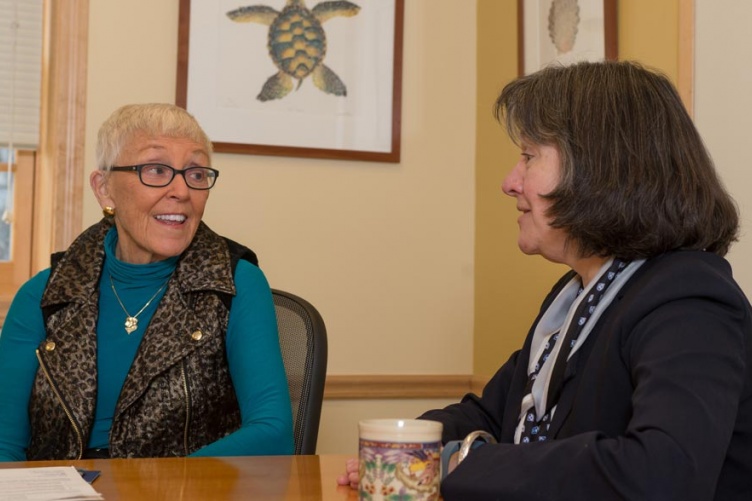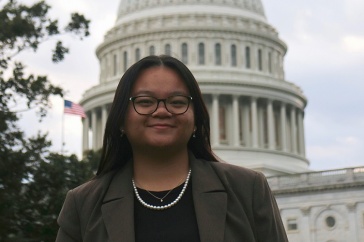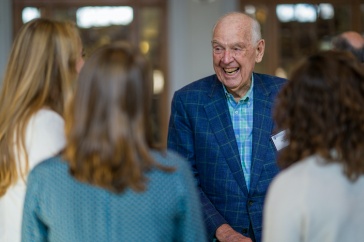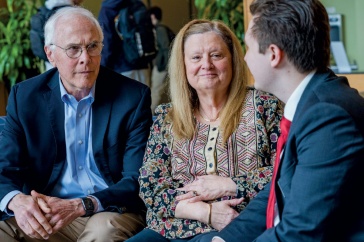
UNH Sustainability Fellows, faculty and staff
“Jo shares our passion for supporting the next generation of sustainability leaders. It’s something she is just on fire about.”
That’s how Tom Kelly, executive director of the UNH Sustainability Institute and the university’s chief sustainability officer, explains the enthusiasm that has driven a decade of generous support from Josephine “Jo” Lamprey, retired businesswoman, environmental pioneer and benefactor of sustainability programs at UNH.
Lamprey’s support of sustainability at UNH started when she saw the climate change call-to-action movie “An Inconvenient Truth.” At the time, she owned Lamprey Brothers, a retail fuel company, but the movie “motivated me to refocus,” she says, to work to raise awareness of climate change and environmental issues.
She soon created a professorship in her name and followed with support for UNH’s Sustainability Institute — which launched a sustainability dual major program in 2015 — and its Summer Sustainability Fellows program, which includes an annual appointment of a Josephine A. Lamprey Sustainability Fellow. Kelly says the program allows students to make the critical connection between theory and practice, offering a transformational education experience for each fellow.
Mikey Pasciuto ’21 , who graduated from UNH in the spring with dual degrees in mechanical engineering and sustainability and a minor in sustainable energy, is a great example. As an undergraduate, Pasciuto worked in manufacturing plants on components ranging from mechanical heart parts to data connector cables and co-founded a start-up called Scrapp that aims to eliminate contamination in the recycling stream. During his Lamprey fellowship, he began work with the New Hampshire Businesses for Social Responsibility (NHBSR) to develop a “Climate Action Challenge” to help Granite State businesses to not only learn about the climate crisis, but actively work to address it. With his fellowship extended through the fall, Pasciuto’s goal is to show businesses the benefits of integrating sustainable practices not as an afterthought, but as something baked into their company’s mission.
“So far, the business community has been very receptive, and I think a lot of people see sustainability as a competitive advantage in this job market,” says Pasciuto. He’s currently collecting materials for what the challenge will look like and plans to launch it before Thanksgiving this year. “None of this would have been possible without this financial support,” he says.
Lamprey’s support has also made a tangible difference to the work of research professor Cameron Wake, UNH’s Josephine A. Lamprey Professor of Climate and Sustainability. Wake leads a program investigating regional climate change through the analysis of ice core records and historical and instrumental data. In addition to teaching classes and lecturing widely on global environmental change, he serves as the program chair for UNH’s sustainability dual major. He’s regularly cited in the media as an expert not only on the climate crisis, but on its intersection with social justice and economic demographics, and its effect on real estate values and the New England tourism industry.
“Jo’s vision and generosity have allowed me to take the climate science I’ve been working on and share that with communities and states across the region,” says Wake. “Her philanthropy has really made a huge difference in allowing me to spread my wings … and make a difference in the way people frame and act on the climate crisis.”
As Kelly explains, Lamprey’s support is critical — now more than ever.
“We are entering now… one of the most pivotal decades in human history. We need to urgently and fundamentally reorient major parts of our society toward sustainability and resilience,” he says. “And look who is standing right next to us as we take this next leap: it’s Jo Lamprey.”
-
Compiled By:
Michelle Morrissey ’97 | UNH Magazine | michelle.morrissey@unh.edu



















































